Module 2 Unit 4 Newspaper (Reading I)
文档属性
| 名称 | Module 2 Unit 4 Newspaper (Reading I) |

|
|
| 格式 | zip | ||
| 文件大小 | 41.9MB | ||
| 资源类型 | 教案 | ||
| 版本资源 | 牛津上海版(试用本) | ||
| 科目 | 英语 | ||
| 更新时间 | 2013-03-05 18:16:23 | ||
图片预览

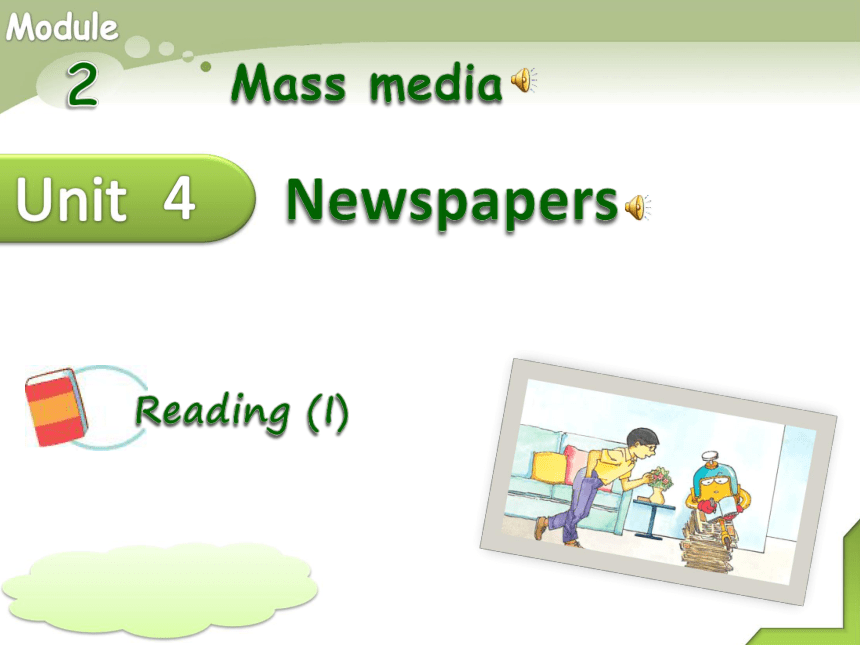
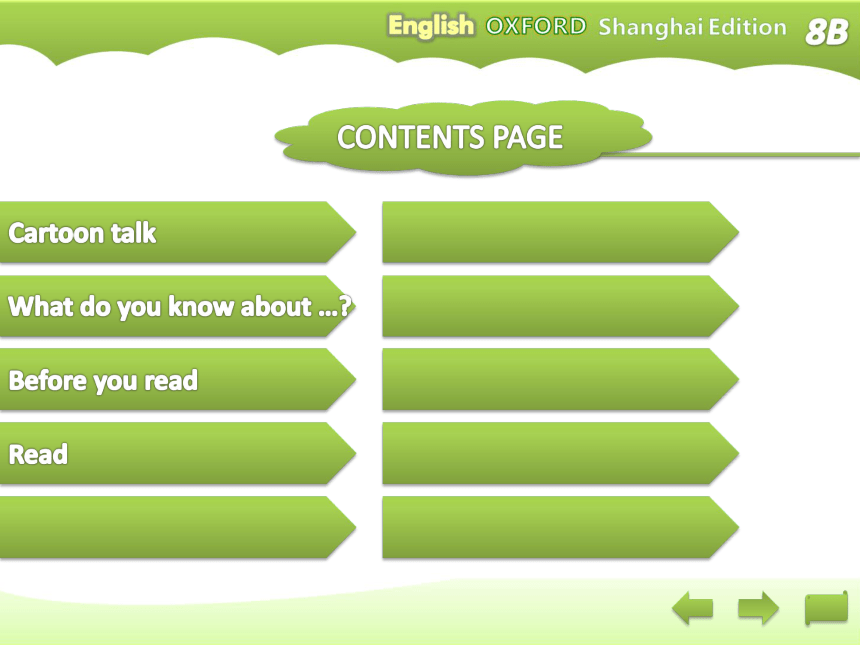
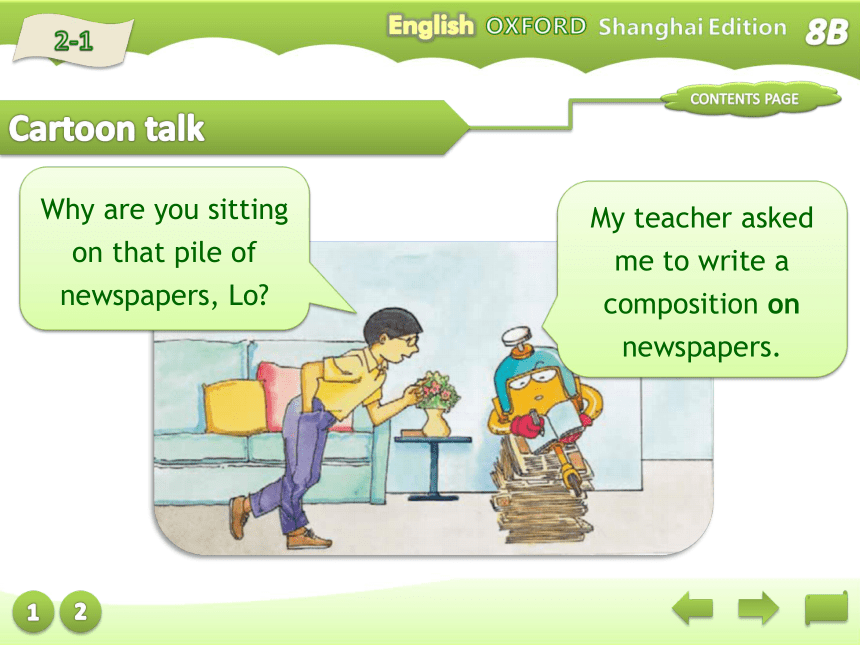
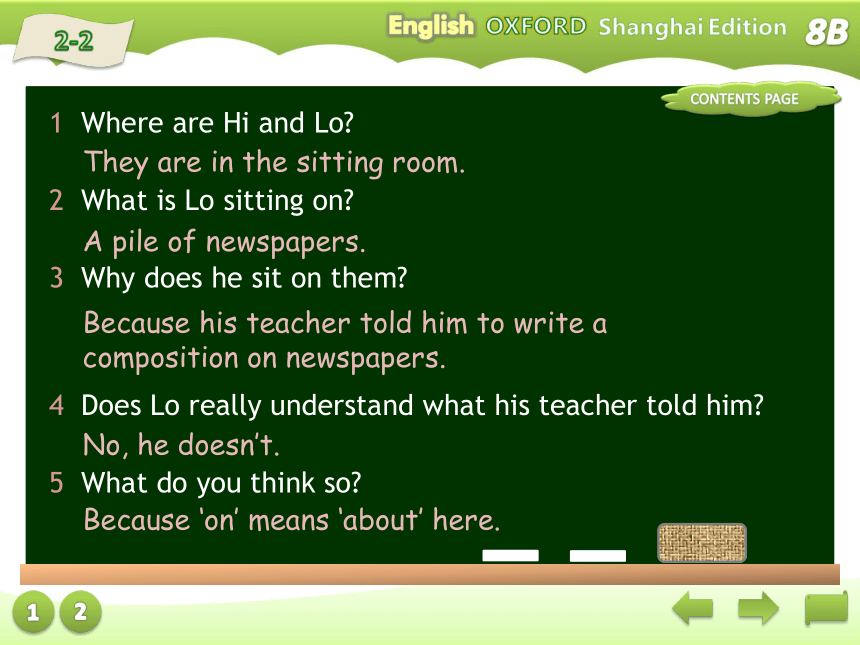



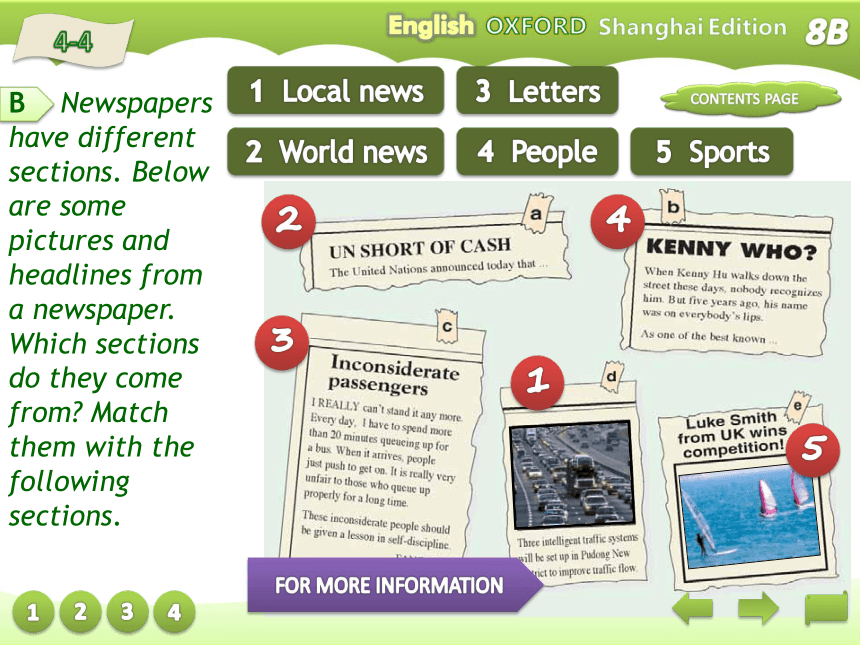
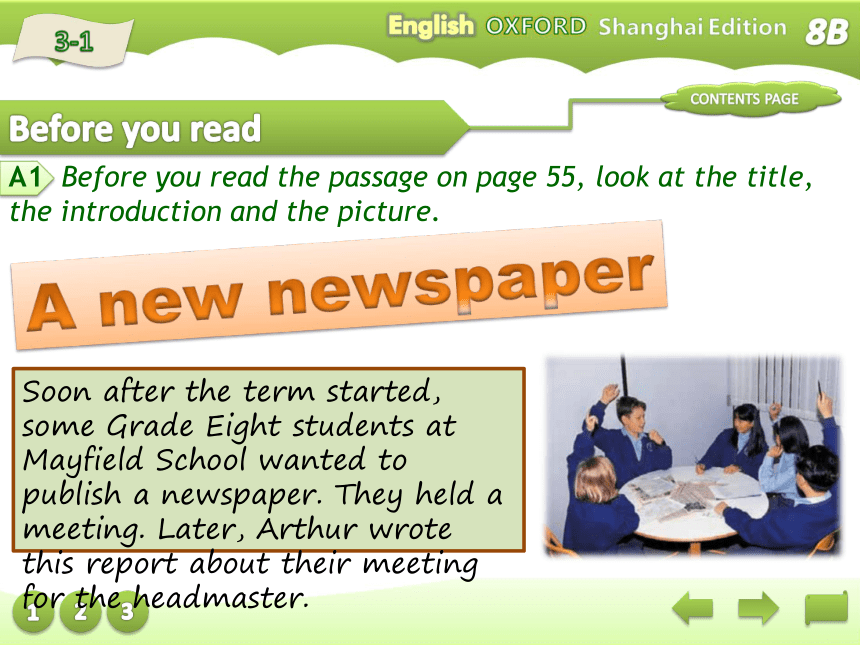
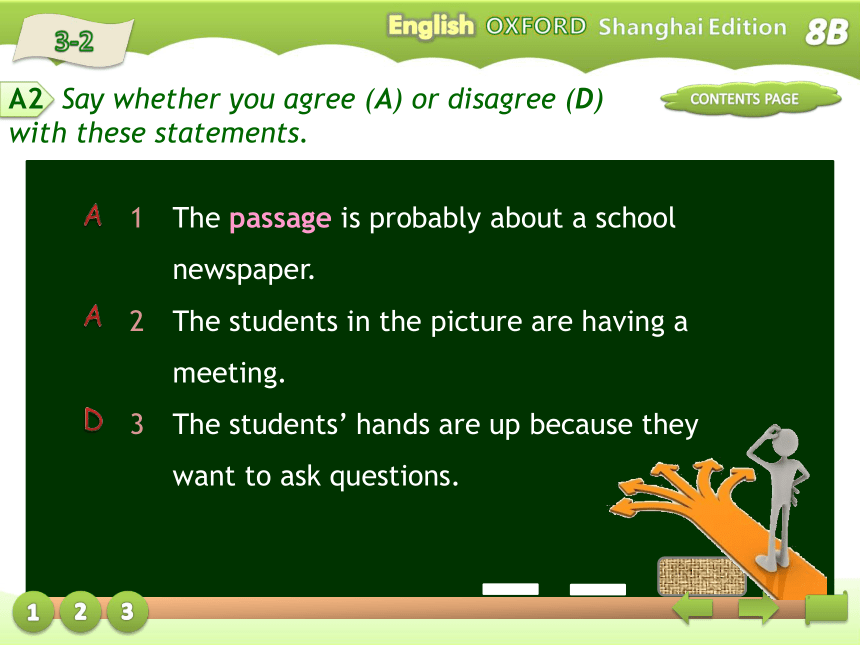
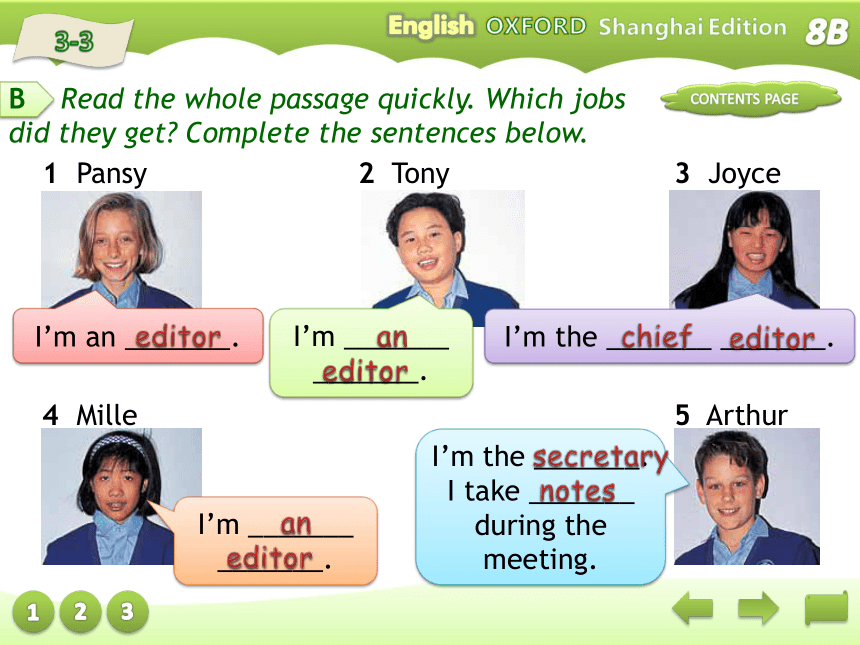
文档简介
课件42张PPT。2Reading (I)Mass mediaNewspapers4Cartoon talkWhat do you know about …?Before you readReadCONTENTS PAGECartoon talk2-1Why are you sitting on that pile of newspapers, Lo?12My teacher asked me to write a composition on newspapers.Where are Hi and Lo?
What is Lo sitting on?
Why does he sit on them?
Does Lo really understand what his teacher told him?
What do you think so?They are in the sitting room.A pile of newspapers.Because his teacher told him to write a composition on newspapers.No, he doesn’t.Because ‘on’ means ‘about’ here.2-212What do you know about …?A1 Do you know any English newspapers available in Shanghai?4-112341234Shanghai Student’s PostChina DailyShanghai Star21st CenturyA2 Do you know any words commonly used in newspaper titles?4-212344-3A3 What kinds of items can we find in a newspaper?1234headlines, letters, world news, local news, editorials, features, sports, advertisements, reviews, business information, TV schedules, weather forecasts, comic strips, etc.B Newspapers have different sections. Below are some pictures and headlines from a newspaper. Which sections do they come from? Match them with the following sections.4-412341 Local news2 World news3 Letters4 People5 Sports24315FOR MORE INFORMATIONBefore you read3-1123A1 Before you read the passage on page 55, look at the title, the introduction and the picture.A new newspaperSoon after the term started, some Grade Eight students at Mayfield School wanted to publish a newspaper. They held a meeting. Later, Arthur wrote this report about their meeting for the headmaster.A2 Say whether you agree (A) or disagree (D) with these statements.1233-2The passage is probably about a school newspaper.
The students in the picture are having a meeting.
The students’ hands are up because they want to ask questions.AAD1233-3B Read the whole passage quickly. Which jobs did they get? Complete the sentences below.1 Pansy2 Tony3 Joyce4 Mille5 ArthurI’m an _______.I’m _______ _______.I’m the _______ _______.I’m _______ _______.I’m the _______. I take _______ during the meeting.editoraneditorchiefeditoraneditorsecretarynotesA new newspaperRead7-112345Soon after the term started, some Grade Eight students at Mayfield School wanted to publish a newspaper. They held a meeting. Later, Arthur wrote this report about their meeting for the headmaster.7-212345We held a meeting after school. Pansy, Tony, Joyce, Millie and I were at the meeting.
First, we decided to elect the chief editor. Tony suggested that we should choose Joyce, because she has experience. She was an editor of her class newspaper last year. Then we all voted for her. We elected Joyce to be the chief editor.7-312345Then Joyce took charge of the meeting. She said that we ought to elect a secretary next. She asked for suggestions.
Millie suggested me, because I have experience too. I was secretary of the Reading Club last year. Then the others voted for me, and I was elected to be the secretary. I started taking notes.7-41234Joyce said that the other three would be editors of the paper. They would be responsible for different sections of the paper. Pansy asked which sections they would have. Joyce told them to talk it over among themselves, and said we would decide at the next meeting.7-51234Then we made a list of some other things we should discuss. For example, how often should we publish the paper? Should it be free to readers, or should they pay for it? What should we call it?7-61234We considered the last question briefly. Pansy asked whether we could call it the Mayfield Sun. Millie suggested the Mayfield Mirror or the Mayfield Star.7-71234We all had different ideas, and so Joyce said that we should think about this a bit longer. We would make a decision about the name at the next meeting. We agreed to conclude the meeting then. We arranged to have the next meeting in one week’s time.ConsolidationWorkbook 8B, page 26.
Local news concerns events in the city where the paper is published. It usually comes immediately after the front page, which carries the biggest stories of the day in the city.
World news is on international events.The Letters page contains the editorial and letters to the editor, e.g., letters about politics, complaints about transport, pollution, noise, road works and opinions.
The People section gives the latest news and gossip about famous people.The Sports pages are traditionally at the back of the newspaper and contain both scores and stories about games or athletes.BACKpassage/?p?s?d?/n.a short section from a book, piece of music, etc. Read the following passage and answer the questions below. term/t??m/n.one of the three periods in the year during which classes are held in schools, universities, etc. The spring term is coming.
It’s nearly the end of term.
publish/?p?bl??/v.produce a book, magazine, CD-ROM, etc. and sell it to the public The first edition was published in 1998.
He works for a company that publishes reference books.
elect/??lekt/v.choose somebody to do a particular job by voting for themObama became the first black man to be elected the US President.
He was elected monitor of our class.chief/t?i?f/adj.most important; main Have you found out the chief reason?
Mr Wang is the chief cook in that restaurant.editor/?ed?t?(r)/n.a person who is in charge of a newspaper, magazine, etc., or part of one, and who decides what should be included He is a famous editor for Shanghai TV Weekly.suggest/s??d?est/v.put forward an idea or a plan for other people to think about May I suggest a white wine with this dish, Sir?
I suggest (that) we go out to eat.
experience/?k?sp??r??ns/n.the knowledge and skill that you have gained through doing something for a period of time; the process of gaining this Do you have any previous experience of this type of work?
She didn’t get paid much but it was all good experience. take charge ofstart to be responsible for; begin to be in charge ofJohn will take charge of the next meeting.
Who will take charge of Class 8B when Miss Li leaves for Los Angeles next week? ought to/???t t?/modal v.(used to say what is the right thing to do) shouldThey ought to apologize.
‘Ought I to write to say thank you?’ ‘Yes, I think you ought to.’
talk … overdiscussThey are now talking over the plan.
We will talk the problem over tomorrow.reader/?ri?d?(r)/n.a person who reads, especially one who reads a lot or in a particular wayThe reader is left to draw his or her own conclusions. consider/k?n?s?d?(r)/v.think about something carefully, especially in order to make a decision We’re considering buying a new car.
He was considering what to do next. briefly/?bri?fl?/adv.for a short time He had spoken to Emma only briefly. whether/?wee?(r)/conj.(used to express a doubt or choice between two possibilities) ifHe seemed undecided whether to go or stay.
It remains to be seen whether or not this idea can be put into practice. a bita littleYour article is a bit long. decision/d??s??n/n.a choice or judgement that you make after thinking and talking about what is the best thing to doHe is really bad at making decisions.
We finally reached a decision (= decided after some difficulty). make a decisiondecide; make up one’s mindHe has made a decision. He decided to leave for Beijing next month.conclude/k?n?klu?d/v.decide or believe something as a result of what you have heard or seenWhat do you conclude from that?
The report concluded (that) the cheapest option was to close the laboratory.
What is Lo sitting on?
Why does he sit on them?
Does Lo really understand what his teacher told him?
What do you think so?They are in the sitting room.A pile of newspapers.Because his teacher told him to write a composition on newspapers.No, he doesn’t.Because ‘on’ means ‘about’ here.2-212What do you know about …?A1 Do you know any English newspapers available in Shanghai?4-112341234Shanghai Student’s PostChina DailyShanghai Star21st CenturyA2 Do you know any words commonly used in newspaper titles?4-212344-3A3 What kinds of items can we find in a newspaper?1234headlines, letters, world news, local news, editorials, features, sports, advertisements, reviews, business information, TV schedules, weather forecasts, comic strips, etc.B Newspapers have different sections. Below are some pictures and headlines from a newspaper. Which sections do they come from? Match them with the following sections.4-412341 Local news2 World news3 Letters4 People5 Sports24315FOR MORE INFORMATIONBefore you read3-1123A1 Before you read the passage on page 55, look at the title, the introduction and the picture.A new newspaperSoon after the term started, some Grade Eight students at Mayfield School wanted to publish a newspaper. They held a meeting. Later, Arthur wrote this report about their meeting for the headmaster.A2 Say whether you agree (A) or disagree (D) with these statements.1233-2The passage is probably about a school newspaper.
The students in the picture are having a meeting.
The students’ hands are up because they want to ask questions.AAD1233-3B Read the whole passage quickly. Which jobs did they get? Complete the sentences below.1 Pansy2 Tony3 Joyce4 Mille5 ArthurI’m an _______.I’m _______ _______.I’m the _______ _______.I’m _______ _______.I’m the _______. I take _______ during the meeting.editoraneditorchiefeditoraneditorsecretarynotesA new newspaperRead7-112345Soon after the term started, some Grade Eight students at Mayfield School wanted to publish a newspaper. They held a meeting. Later, Arthur wrote this report about their meeting for the headmaster.7-212345We held a meeting after school. Pansy, Tony, Joyce, Millie and I were at the meeting.
First, we decided to elect the chief editor. Tony suggested that we should choose Joyce, because she has experience. She was an editor of her class newspaper last year. Then we all voted for her. We elected Joyce to be the chief editor.7-312345Then Joyce took charge of the meeting. She said that we ought to elect a secretary next. She asked for suggestions.
Millie suggested me, because I have experience too. I was secretary of the Reading Club last year. Then the others voted for me, and I was elected to be the secretary. I started taking notes.7-41234Joyce said that the other three would be editors of the paper. They would be responsible for different sections of the paper. Pansy asked which sections they would have. Joyce told them to talk it over among themselves, and said we would decide at the next meeting.7-51234Then we made a list of some other things we should discuss. For example, how often should we publish the paper? Should it be free to readers, or should they pay for it? What should we call it?7-61234We considered the last question briefly. Pansy asked whether we could call it the Mayfield Sun. Millie suggested the Mayfield Mirror or the Mayfield Star.7-71234We all had different ideas, and so Joyce said that we should think about this a bit longer. We would make a decision about the name at the next meeting. We agreed to conclude the meeting then. We arranged to have the next meeting in one week’s time.ConsolidationWorkbook 8B, page 26.
Local news concerns events in the city where the paper is published. It usually comes immediately after the front page, which carries the biggest stories of the day in the city.
World news is on international events.The Letters page contains the editorial and letters to the editor, e.g., letters about politics, complaints about transport, pollution, noise, road works and opinions.
The People section gives the latest news and gossip about famous people.The Sports pages are traditionally at the back of the newspaper and contain both scores and stories about games or athletes.BACKpassage/?p?s?d?/n.a short section from a book, piece of music, etc. Read the following passage and answer the questions below. term/t??m/n.one of the three periods in the year during which classes are held in schools, universities, etc. The spring term is coming.
It’s nearly the end of term.
publish/?p?bl??/v.produce a book, magazine, CD-ROM, etc. and sell it to the public The first edition was published in 1998.
He works for a company that publishes reference books.
elect/??lekt/v.choose somebody to do a particular job by voting for themObama became the first black man to be elected the US President.
He was elected monitor of our class.chief/t?i?f/adj.most important; main Have you found out the chief reason?
Mr Wang is the chief cook in that restaurant.editor/?ed?t?(r)/n.a person who is in charge of a newspaper, magazine, etc., or part of one, and who decides what should be included He is a famous editor for Shanghai TV Weekly.suggest/s??d?est/v.put forward an idea or a plan for other people to think about May I suggest a white wine with this dish, Sir?
I suggest (that) we go out to eat.
experience/?k?sp??r??ns/n.the knowledge and skill that you have gained through doing something for a period of time; the process of gaining this Do you have any previous experience of this type of work?
She didn’t get paid much but it was all good experience. take charge ofstart to be responsible for; begin to be in charge ofJohn will take charge of the next meeting.
Who will take charge of Class 8B when Miss Li leaves for Los Angeles next week? ought to/???t t?/modal v.(used to say what is the right thing to do) shouldThey ought to apologize.
‘Ought I to write to say thank you?’ ‘Yes, I think you ought to.’
talk … overdiscussThey are now talking over the plan.
We will talk the problem over tomorrow.reader/?ri?d?(r)/n.a person who reads, especially one who reads a lot or in a particular wayThe reader is left to draw his or her own conclusions. consider/k?n?s?d?(r)/v.think about something carefully, especially in order to make a decision We’re considering buying a new car.
He was considering what to do next. briefly/?bri?fl?/adv.for a short time He had spoken to Emma only briefly. whether/?wee?(r)/conj.(used to express a doubt or choice between two possibilities) ifHe seemed undecided whether to go or stay.
It remains to be seen whether or not this idea can be put into practice. a bita littleYour article is a bit long. decision/d??s??n/n.a choice or judgement that you make after thinking and talking about what is the best thing to doHe is really bad at making decisions.
We finally reached a decision (= decided after some difficulty). make a decisiondecide; make up one’s mindHe has made a decision. He decided to leave for Beijing next month.conclude/k?n?klu?d/v.decide or believe something as a result of what you have heard or seenWhat do you conclude from that?
The report concluded (that) the cheapest option was to close the laboratory.
